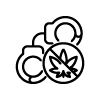Cannabis Laws in Turkey

Fully Legalized for Adult Use?

Fully Legalized for Medical Use?

CBD only?

Decriminalized?
Disclaimer: This information is provided for general informational purposes only and may not reflect the most current legal requirements in Turkey. Cannabislaws.global recommends you consult with a qualified local attorney or legal expert for accurate and up-to-date information. This information is not intended as legal advice and should not be relied upon as such. Use of this information is at your own risk.
Does Turkey have a recreational use program?
No, Turkey does not have a recreational use program. The Republic of Turkey forbids the personal use of cannabis, and those who violate the law risk severe prison sentences.
Does Turkey have a medical program?
Yes, medical cannabis is legal in Turkey. Legislation for the prescription use of sublingual cannabis products—like Sativex—was adopted in 2016.
Cannabis used as a full plant is still prohibited.
What are the rules for medical use?
In Turkey, medicinal cannabis is only permitted as sublingual cannabinoid medication, and patients are required to receive a “red prescription” to obtain this drug.
Patients who want to use these herbal remedies have to consult with a licensed medical professional who can write red prescriptions. After evaluating the patient’s condition, the doctor will decide if medicinal cannabis is the best course of action or a necessary one.
What are the qualifying medical conditions for eligibility?
- Cancer
- Multiple sclerosis symptoms
- Psychiatric disorders
- Pain
- Spasms
What are the medical program limits?
The Turkish government does, in extremely limited circumstances, permit pharmaceutical usage and medical cannabis research. However, for whatever reason, it is still unlawful to smoke marijuana or consume plant-based extracts containing any amount of THC.
Limited cannabis-based pharmaceutical sales for medical purposes have been authorized by the Ministry of Health. The approval was limited to physician-prescription-only sublingual sprays like Sativex. All other cannabis strains and complete plants are still illegal in the nation as of right now.
In Turkey, cannabis is not available for recreational or medical use to tourists. Likewise, you are not allowed to import it into this country.
What methods of use are permitted under the medical program?
Oral cannabinoid prescriptions are now available for patients, but whole-plant cannabis is still illegal.
Is there home delivery for medical cannabis?
Some websites provide patients with medical cannabis home delivery services.
Is CBD legal in Turkey?
Turkey does not have explicit laws on CBD, but THC levels are not permitted in CBD formulations.
Online resources suggest that if the THC concentration of hemp-derived CBD products, such as CBD oil, is zero, then it could be acceptable to possess them in Turkey. Mixtures with small quantities of THC, however, are forbidden.
Pharmacies also sell some CBD-infused medical medications, such as Sativex. In addition, hemp oil and other natural CBD extracts are not recognized as medical treatments in the Republic of Turkey.
Is cannabis decriminalized in Turkey?
No, cannabis is not decriminalized in Turkey. Whether for personal use or not, using any kind of narcotic is prohibited and subject to legal action.
Any illegal drug, including cannabis, that is purchased, possessed, or received carries a sentence of one to two years in prison. Treatment and/or probation are also available, with terms of up to three years. The courts have the authority to determine sentences in cases where users reject treatment or violate probationary conditions.
Production or trafficking carries a minimum 10-year prison sentence, while sale and supply carry a five-to-ten-year sentence.
Disclaimer: This information is provided for general informational purposes only and may not reflect the most current legal requirements in Turkey. Cannabislaws.global recommends you consult with a qualified local attorney or legal expert for accurate and up-to-date information. This information is not intended as legal advice and should not be relied upon as such. Use of this information is at your own risk.

CannabisLaws.global
Your global guide to cannabis laws

Turkey Legal Aid
contact [email protected] to own this page
